Suivi et évaluation
La plupart des défis liés au suivi et à l’évaluation, comme la quantité insuffisante d’investissements et le manque de capacités, ne sont pas spécifiques à l’assistance monétaire, mais ceux qui le sont concernent principalement le suivi des résultats des transferts non affectés. La flexibilité des transferts monétaires peut compliquer la définition d’indicateurs de résultats appropriés, qui pourraient impliquer un mélange d’indicateurs spécifiques au secteur et transversaux. En parallèle, il existe des limitations au moment de collecter des données précises sur la manière dont les transferts monétaires sont dépensés.
Les signataires du Grand Bargain se sont engagés à garantir que des mécanismes de suivi et d’évaluation pertinents des transferts monétaires soient en place, et à assurer une meilleure compréhension des coûts, avantages, impacts et risques de cette modalité par rapport à d’autres. En partant de cet engagement, le chantier du Grand Bargain sur les transferts monétaires a établi plusieurs points d’action, dont le développement d’indicateurs de résultats communs pour les transferts monétaires à usages multiples, et des indicateurs pour l’analyse de l’optimisation des ressources. L’analyse systématique de l’optimisation des ressources a été rendue difficile par plusieurs facteurs, dont un manque d’approches approuvées, le besoin en données sur les résultats en termes de qualité et le caractère intensif de l’analyse.
Priorités actuelles
Dans le cadre des engagements du chantier du Grand Bargain sur les transferts monétaires, le CALP Network a co-dirigé (avec l’USAID et CRS) la mise au point d’indicateurs de résultats des transferts monétaires à usages multiples. Le projet à tester est actuellement disponible en anglais, espagnol et français, via la bibliothèque.
Initiatives associées
Contenu présenté

Indicateurs de résultats des transferts monétaires à usages multiples : Projet final à tester
Guides et outils
Les indicateurs présentés dans ce document se concentrent sur les principaux objectifs des TMUM humanitaires et sur les résultats auxquels les transferts monétaires à usages multiples peuvent le plus fortement contribuer. (Par exemple, certaines interventions en TMUM visent à relier les personnes aux systèmes de protection sociale après la fin du TMUM; mais nous n’avons pas inclus...

Monitoring 4 CTP: Monitoring Guidance for CTP in Emergencies
Guidelines and Tools
This guidance provides a central resource to promote a common understanding of the most important monitoring considerations for humanitarian projects using cash transfer programming (CTP). The primary audience for this guidance is field-level practitioners, from organisations directly involved in the design, implementation, monitoring, and accountability of projects using cash and vouchers...

Cost-Efficiency Analysis of Basic Needs Programs: Best Practice Guidance for Humanitarian Agencies
Guidelines and Tools
The Efficiency, Effectiveness and Value for Money Sub-Workstream is pleased to share the final output on Cost-Efficiency Analysis of Basic Needs Programs: Best Practice Guidance for Humanitarian Agencies (attached).
Cost-efficiency analysis estimates the ratio of program costs to outputs created, allowing you to compare cost-per-output for programs which all produced the same output. Such...
Thematic lead
Contenu récent
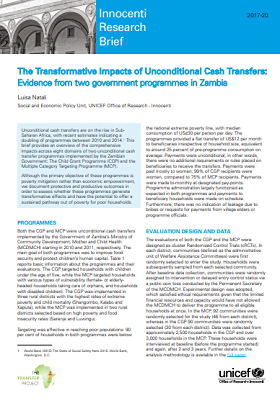
The Transformative Impacts of Unconditional Cash Transfers: Evidence from two government programmes in Zambia
Report
Unconditional cash transfers are on the rise in Sub-Saharan Africa, with recent estimates indicating a doubling of programmes between 2010 and 2014.This brief provides an overview of the comprehensive
impacts across eight domains of two unconditional cash transfer programmes implemented by the...
The effect of financial aid from UK Aid Girls’ Education South Sudan programme and EU IMPACT programme to education in South Sudan in 2017
Report
This paper is an update to the previous Girls’ Education South Sudan working paper that looked at the effect of financial interventions (capitation grants and girl’s cash transfers) by Girls’ Education South Sudan, a collaboration of UK Aid and the Ministry of General Education and Instruction,...

Kenya Red Cross Society Using New Technology to Reach Communities in Hardship Areas
Report
Kenya Red Cross Society responded to the severe drought through cash transfers in Marsabit county. Unlike an earlier drought, where KRCS used manual system to pay beneficiaries in the same geographical area, this year the organisation used a payment technology provided by a company called Compulynx....

ELAN Humanitarian KYC Case Studies
Report
Know Your Customer (KYC) regulations, also known as customer due diligence, are designed to combat money laundering, terrorist financing, and other related threats to the financial system. They refer to the ID checks that financial institutions perform to comply with national financial regulations....

Cash for Education: A global review of UNHCR programmes in refugee settings
Report
This review provides an overview of the use of cash assistance in 45 cash-related education programmes in 21 UNHCR operations. It highlights the key opportunities and challenges with the use of cash for education and provides key direction for future programming and related protection considerations....

Humanitarian Cash Transfers in the Democratic Republic of the Congo: Evidence from UNICEF’s ARCC II Programme
Report
From March 2013 to September 2015, UNICEF and three partner organizations (Concern Worldwide, Mercy Corps, and Solidarités International), collaborated to deliver what was at the time the single-largest unconditional cash transfer programme for humanitarian response in the Democratic Republic of the...

A buffer against the drought
Report
The Government of Kenya in partnership with DFID undertake a long term social protection program(Hunger Safety Net Program) in Northern Kenya reaching out to poor households with bi monthly cash transfers. So much investment has been put in this program including pre-registration and carding of...

Karamoja Market Assessment
Report
A market assessment of the feasibility of cash transfers in the Karamoja region – Executive summary

2016/7 Winter Inter-Agency PDM Report
Report
Between August 2016 and March 2017, fourteen organizations provided more than 140,000 Syrian refugee households in Turkey with assistance to stay warm through the harsh winter season. Organizations delivered winter support to refugees in 52 of Turkey’s 81 provinces, primarily through restricted and...

Can Conditional Cash Transfers improve the uptake of nutrition interventions and household food security? Evidence from Odisha’s Mamata scheme
Report
There is considerable global evidence on the effectiveness of cash transfers in improving health and nutrition outcomes; however, the evidence from South Asia, particularly India, is limited. In the context of India where more than a third of children are undernourished, and where there is considerable...
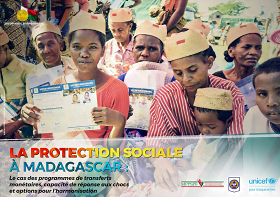
La Protection Sociale à Madagascar – Le Cas des Programmes de Transferts Monétaires: Capacité de réponse aux chocs et options pour l’harmonisation
Rapport
This study was undertaken as commissioned by the Government of Madagascar (Ministry of Population, Social protection and Women’s Promotion and the National Office of Risk and Disaster Management) in coordination with the members of the emergency cash group and with UNICEF’s funding and technical...
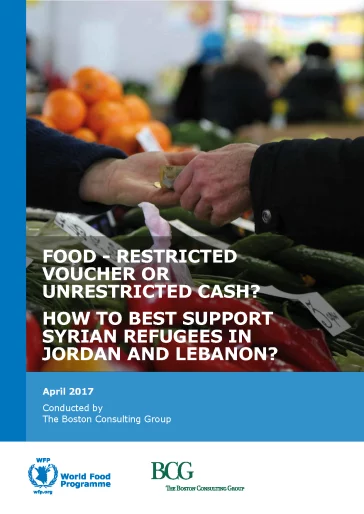
Food – Restricted Voucher or Unrestricted Voucher Cash? How to Best Support Syrian Refugees in Jordan and Lebanon?
Report
The World Food Programme (WFP) plays a pivotal role in the food security of Syrian refugees within the Syria +5 region. WFP periodically reviews its operational approach, so it is timely to consider what the best modality for the next phase of the response might be, including the pros and cons of...

Enacting urban cash for work programmes in Lebanon in response to the Syrian refugee crisis
Guidelines and Tools
Humanitarian crises in cities require responses that reflect the urban context,address urban challenges, and provide urbanised solutions. This paper focuses on providing guidance on good practice in cash for work (CfW) programmes. Focusing on Lebanon and the Syrian refugee crisis, the paper provides nine...

Scaling-up CTP in Somalia: Reflecting on the 2017 Drought Response
Report
This report summarises discussions that took place during a half-day workshop in September 2017. It built on issues identified as needing action in May, as outlined in the ‘Looking back to move forward: Building on learning from 2011 to strengthen the 2017 drought response in Somalia learning report’.
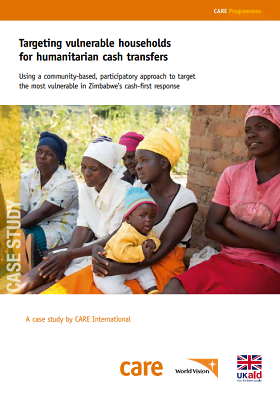
Targeting vulnerable households for humanitarian cash transfers: using a community based, participatory approach to target the most vulnerable in Zimbabwe’s cash-first response
Report
Over 73,000 drought affected households across 15 districts in Zimbabwe received monthly multi-purpose, unconditional cash transfers. With such a large caseload over a wide area, 100% verification of the households would not have been the most resource efficient approach. Moreover, there would have been a...

Exploitation des technologies numériques dans les transferts monétaires mis en oeuvre lors de la réponse à l’épidémie d’Ebola
Rapport
L’adoption des technologies numériques s’est accrue parallèlement à l’essor des transferts monétaires, souvent au moyen de transferts électroniques, car ces solutions présentent des avantages en matière de transparence et d’efficacité (gain de temps et d’argent). En 2015, le Haut Panel...
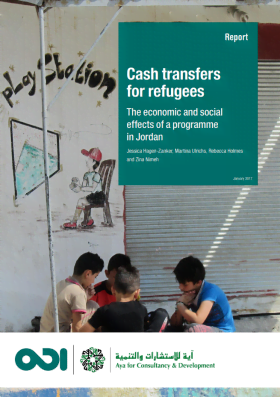
Cash transfers for refugees. The economic and social effects of a programme in Jordan
Report
The world is now experiencing the biggest refugee crisis since the second world war, with around 21.35 million refugees reported in 2015 (UNHCR, 2016a). Those countries with the highest outflow of refugees – Syria, Afghanistan and Somalia in 2015 – are facing ongoing conflicts that are unlikely...

Effects of Unconditional Cash Transfers on the Outcome of Treatment for Severe Acute Malnutrition (SAM): A Cluster-Randomised Trial in the Democratic Republic of the Congo
Report
Cash transfer programs (CTPs) aim to strengthen financial security for vulnerable households. This potentially enables improvements in diet, hygiene, health service access and investment in food production or income generation.The effect of CTPs on the outcome of children already severely malnourished...

Cash Transfer Programming: Lessons from northern Iraq
Report
In situations of conflict, disaster and protracted crisis, displaced persons not only face physical threats but are also confronted with the challenge of economic survival. High levels of general unemployment or legal barriers to labour market entry often restrict access to jobs and income, and...

The Financial Journey of Refugees Full Report
Report
This document details how refugees and migrants from the Middle East, South and Central Asia and East, West and North Africa finance their journeys and manage money along the way.
